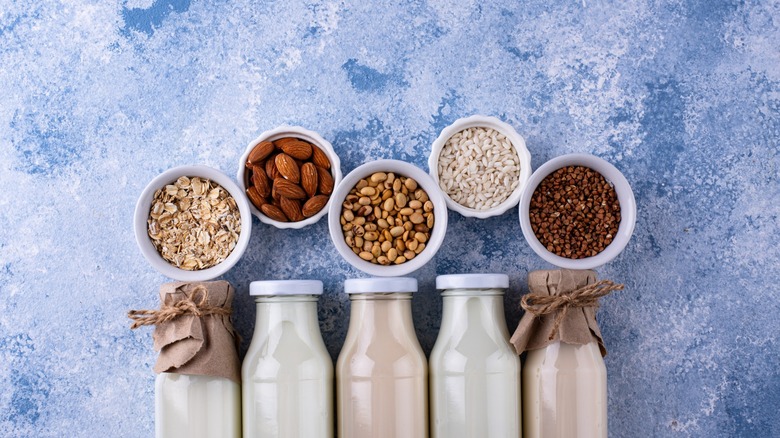What To Keep In Mind When Swapping Regular Milk With Plant-Based Alternatives In Recipes
You may have noticed in recent years the amount of shelf space in grocery stores being taken over by plant-based milk alternatives. You may also be a part of this growing consumer audience who are choosing to eliminate or decrease their intake of dairy products. By the end of 2030, the global plant-based milk industry is projected to be worth $123 billion. And with so many consumers reaching for alternatives to cow's milk, the question is bound to arise, "Can I swap cow's milk with plant-based milk in this recipe?" The answer is a resounding, yes! However, there are a few particulars to know before making this substitution that can make or break whatever you're cooking or baking.
These days, you can easily find several different varieties of plant-based milk alternatives such as milk made from legumes, nuts, coconut, or grains. Each type of milk has its own unique flavor which is often similar to milk, though some of these options have a creamier consistency than others. Plant-based milk alternatives typically have different options within them, such as flavored or sweetened milks. Another characteristic specific to each variety is the nutritional composition. All of these stipulations (flavorings, sweeteners, and differing nutrition) are things to look out for when substituting in non-dairy milk.
Unsweetened and unflavored are typically best
When it comes to cooking, you want to make sure your plant milk is unflavored and unsweetened — no thank you vanilla soy milk mashed potatoes. Although cow's milk has naturally occurring sugars, so do most of the plant-milk derivatives, which makes sweetened varieties unnecessary. You can substitute any type (soy, pea, nut, coconut, grain) one-to-one in a recipe that calls for dairy milk and still achieve almost identical outcomes in terms of texture and flavor. That being said, if you're following a recipe for something rich-tasting that needs the fat content of cow's milk, opting for a higher fat content plant-milk (such as coconut milk) will help you achieve the desired outcome.
As for baking with plant-based milk, the same rules apply only with slightly more wiggle-room when it comes to choosing unflavored and unsweetened varieties. In some recipes, these two factors could actually compliment a baked good by either changing the flavor or adding sweetness. A sweetened vanilla or chocolate almond milk clearly doesn't belong as a milk substitute in savory buttermilk biscuits, but either could definitely add a flavor-twist in a boxed-cake recipe!

